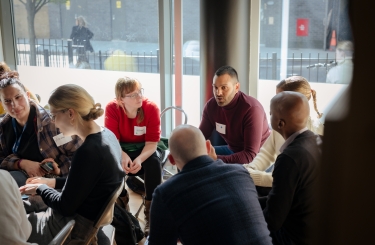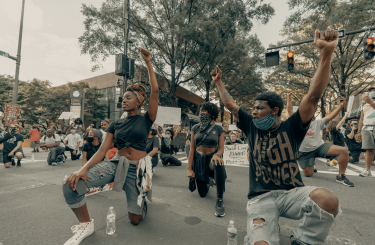Related


In late 2023, James Banks, Chief Executive of London Funders spoke at the Greater London Authority’s ‘The Power of Participation’ event, linked to the Building A Fairer City action plan, The London Partnership Board’s action plan for tackling structural inequality in London. Following on from the event, James shares his reflections on whether we can build a fairer city by being more participative in the way we fund.
The Building A Fairer City action plan, developed by the London Partnership Board, sets out two specific challenges for the funding sector:
This is important because we know community groups and organisations led-by-and-for communities facing discrimination are not receiving the support they need. To name but a few examples, only 1.8% of grants go to the women and girls sector, in 2020 87% of groups led by Black or racially minoritised communities didn’t have funding to last more than three months, 40% of groups in LGBT Consortium’s membership have an income of less than £1k a year, and 32% have no income at all. For Deaf and disabled people – only 10% of Deaf and Disabled People’s Organisations (DPOs) responding to a survey were from a region where they hadn’t seen DPOs close in the last five years.
Looking at the equity and justice funding picture overall – according to data analysed by the Civic Power Fund, only 5.7% of UK foundation giving went towards work tackling injustice last year. The data also showed that “the majority of grants are supporting organising work focused on a specific social issue, rather than shifting power to a specific community”. As a result, “funders are still by and large setting the terms of the work”.
And it’s not just about a lack of funding – it’s also about who is making the decisions about where funding goes. Research from the Association of Charitable Foundations on the Trustee Boards of Trusts and Foundations found they were 99% white, that male trustees outnumber women by two to one, that 58% of Trustees are over the age of 64, with just 3% under the age of 45.
Firstly, looking at this from the positive side…
There’s strong recognition that decision-making is more effective and just when it is driven by the expertise of the people who know best – in a place, affected by an issue, with the right blend of lived and learned experience.
As we shared last week, there are several great examples of participation in grantmaking from many of our members, including the London’s Giving movement involving local people in decisions, local authorities shaping approaches with residents, and funders combining participation and equity in designing their funding programmes.
There is a huge amount of learning about diversity in decision-making that can be shared too – to counter the stats from ACF about Trusts and Foundations, in our membership, we know local authorities are doing amazing work on diversifying decision-making. For example, in Hounslow, where elected Councillors from Black, Asian or minority ethnic communities are over-represented compared to the local population; or Lewisham, where research shows it has a staff team that most closely matches its local community out of all local authorities.
Also, linked to the ambitions of Building A Fairer City, 76% of our members have told us that they are taking steps to advance equity and justice.
We’ve seen this commitment to equity and justice reflected in our collaborations – for the London Community Response, and now for Propel, funders working with equity partners in the design and delivery of funding programmes has led to the majority of funding flowing to groups led by and for communities facing discrimination.
Looking at this from the other side, and continuing the P theme, I think there are six areas for us to consider – proactive, politics, people, prejudice, proportion, and power.
Proactive – the statistics highlighted above show that groups have not been funded well for a long time, and it means in some places and in some communities, there are no groups, or no formal groups with the right structures and systems in place to be “funding ready”. Do funders need to step into that space, go out and make things happen, address funding cold spots, and invest in infrastructure organisations? If so, how do you do proactive work in a participative way?
Politics – can participative models lead to the fairer future we want if the people taking part in them do not understand their own oppression, if we don’t have political education and understanding? I grew up gay and had a good education, but it’s only in recent years that I’ve started to understand how growing up in a straight world, in systems and places designed by straight people for straight people, educated in a world of section 28, hearing constantly, even on the streets of London now, what some people think of gay people, how internalised my own homophobia and oppression was. How do we ensure that participative approaches enable people to understand and be themselves, not just be the token person on a panel without the political education to tackle the root causes of what makes this world so unfair for so many?
People – continuing that theme of the personal, how do we do participation well, in ways that protect people? How possible is it for you to be the lone person in a group representing “your” community, how hard is it for you to be sharing your experiences, often traumatic ones, in ways that don’t take everything from you and still lead to no change for your community?
Prejudice – there can be an assumption that community equals good, that everyone is on the same path to justice, that everyone believes that none of us is free until all of us are free, but I’m not sure that’s the case. As well as the point earlier about how people can internalise oppression, it’s also true that people affected by prejudice can themselves be prejudiced – it seems obvious to say, you can be a woman and racist, you can be Black and ableist, you can be disabled and homophobic, but is it obvious in the ways we design participation? How can participative approaches recognise the reality of the way the world works, not just how we wish it is?
Proportion – is the proportion of money being spent in participative ways able to achieve real change when set against the money spent in other ways? Lots of our community would be interested in ensuring justice for all. In London, the members of London Funders give out over £700m a year – imagine if all of that was directed, through participative approaches, to activities designed to advance justice for all. Even if it were, it would look insignificant compared to the £3.4bn that will be spent on policing in London this year, with a police force that has been described as institutionally racist, homophobic and misogynistic. What level of change can we expect to see in the world if we don’t think about how participation and voice shape services and funding of all services, not just the work funded by grants?
Power – we need to be clear that change doesn’t always happen through funding, and in talking about participation we must also be careful not to confuse pounds with power. Some of our biggest steps towards a fairer future are taken by people taking matters into their own hands – to borrow the title of a book compiled by Incite, the network of radical feminists of colour, “The revolution will not be funded”. Some of the basic human rights I have now are because people got angry, organised and fought for change - the riots following the Stonewall raids in the late 1960s being one powerful example. You don’t normally fund a riot, so how do we enable participation in all its forms, and make sure that money doesn’t take away power from people we want to ensure hold it?
Nothing here is a problem that can’t be overcome with another P – passion – and that’s something we see in abundance across London Funders’ membership, and across the civil society and community groups we’re proud to work with.

